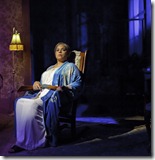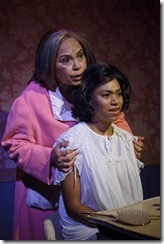 The year, 1955; the place, Natchez, Mississippi, the summer of Mississippi Burning, when college students—white and black—came down from the North to register Southern Negroes to vote, a right denied them by the white citizens of their state. A way of life is about to end, for all the townsfolk of Natchez, no matter the color of their skin. (left: Lynda Gravátt in the Premiere Stages at Kean University’s Production of Follow Me to Nellie’s by Dominique Morisseau, directed by John Wooten. Photo by Roy Groething)
The year, 1955; the place, Natchez, Mississippi, the summer of Mississippi Burning, when college students—white and black—came down from the North to register Southern Negroes to vote, a right denied them by the white citizens of their state. A way of life is about to end, for all the townsfolk of Natchez, no matter the color of their skin. (left: Lynda Gravátt in the Premiere Stages at Kean University’s Production of Follow Me to Nellie’s by Dominique Morisseau, directed by John Wooten. Photo by Roy Groething)
Dominique Morisseau's searing look at this tense and momentous period in our nation's history, Follow Me to Nellie's, was the Premiere Stages Festival winner for 2011; the prize is the all-out production now onstage at Premiere Stages on the campus if Kean University in Union. And a first-rate production it is, with some of the finest actors delivering some of the most natural sounding dialogue I've heard on a stage this year. They're so good that they become the characters they portray, drawing the audience into their slice of life so convincingly that one could hear a pin drop in the theater during the entire performance.
 The "Nellie's" of the title is the brothel run by Miss Nellie Jackson, a no-nonsense madam who knows how to keep her whores in line and her white customers happy. With a new white sheriff, the Civil Rights movement gaining momentum and her health failing, Nellie finds herself in a bind when her good friend Rollo asks her to permit Ossie Brown, a young black man come from Washington, DC, to open an NAACP office to stay in her "back house" while he's in town. At first she balks, not wanting to call white attention to her business, but she reluctantly relents, a decision that will wreak havoc in her life, the lives of her employees and, most importantly, the life of Na Rose (right) , a young orphan she rescued from a hurricane and whom she considers her daughter.
The "Nellie's" of the title is the brothel run by Miss Nellie Jackson, a no-nonsense madam who knows how to keep her whores in line and her white customers happy. With a new white sheriff, the Civil Rights movement gaining momentum and her health failing, Nellie finds herself in a bind when her good friend Rollo asks her to permit Ossie Brown, a young black man come from Washington, DC, to open an NAACP office to stay in her "back house" while he's in town. At first she balks, not wanting to call white attention to her business, but she reluctantly relents, a decision that will wreak havoc in her life, the lives of her employees and, most importantly, the life of Na Rose (right) , a young orphan she rescued from a hurricane and whom she considers her daughter.
Like Kathryn Stockett's popular novel, The Help, Morisseau's play gives us a harrowing Negro's-eye view of what it was like to live as a black person in pre-Civil Rights South. By virtue of Nellie’s sharp business skills (she sends the sheriff bourbon when she finds out he drinks it, and she helps promote construction of a baseball stadium for the town's white team), "Everybody likes Nellie," so it is easy to see why the change that's coming might not be to her liking. After all, she runs a prosperous business, owns her own house and dresses very well. It never crosses her mind that Na Rose might not want to inherit the house, but not the business; the beautiful young woman has dreams of her own and they don't include remaining in Natchez, a town that's "small but mighty."
The Southern black pronunciation will, at first, make one listen hard to catch all that's being said, but in a few minutes, the lovely cadence will be enough to get the conversations' gist. Besides, the actors' portrayals are so engaging that you find yourself wondering what is going to happen next to these people, so you listen even harder.
 As Nellie, Linda Gràvatt is superb, tough on her employees but loving toward her ward. She commands the stage whenever she appears, her performance is that riveting. Michelle Wilson's portrayal of chief whore Ree Ann mimics that of her boss; she has no patience for the lollygagging about so beloved by Nyahale Allie as Marla and Ley Smith as Sandy. These two would rather talk about men (complete with graphic detail and gestures) than straighten up the house before Nellie comes home from church. That Marla dreams of her beau Jimmy's return for her is very sad, and Allie's depiction of a very drunk Marla is right on the mark. Harold Surratt's Rollo is dignified and courageous: an old man, he is ready to risk everything to vote because he wants, for once, "to walk upright." (Above L-R: Michelle Wilson, Nyahale Allie, and Ley Smith.)
As Nellie, Linda Gràvatt is superb, tough on her employees but loving toward her ward. She commands the stage whenever she appears, her performance is that riveting. Michelle Wilson's portrayal of chief whore Ree Ann mimics that of her boss; she has no patience for the lollygagging about so beloved by Nyahale Allie as Marla and Ley Smith as Sandy. These two would rather talk about men (complete with graphic detail and gestures) than straighten up the house before Nellie comes home from church. That Marla dreams of her beau Jimmy's return for her is very sad, and Allie's depiction of a very drunk Marla is right on the mark. Harold Surratt's Rollo is dignified and courageous: an old man, he is ready to risk everything to vote because he wants, for once, "to walk upright." (Above L-R: Michelle Wilson, Nyahale Allie, and Ley Smith.)
The three other actors form what one might call a lovers' triangle. Warner Miller's Ossie Brown is charming and polite, yet he’s set on carrying out his mission. He claims that "living is a whole lot scarier than dying," and when he falls for Na Rose, he includes her in his plans for the future. (You may remember Miller as the lead in last year's Festival winner, Lost Boy at Whole Foods.) Kelly McCreary as Na Rose sure is worthy of his attention. She's beautiful and talented (the two meet in a very funny scene where she pretends to be singing in a juke joint wearing just her underwear) and very solicitous of Nellie, but she cannot bring herself to tell the older woman about her dreams. The villain of the piece is Adam Couperthwaite as the sheriff's son, Tom Jr., who comes to warn Nellie that she's in the law's radar. It’s a thankless rose, but Couperthwaite is terrific. When he encounters Na Rose, he's smitten too, for she reminds him of a Negro girlfriend he once had. Couperthwaite has a fresh-face handsomeness under which lurks menace, a feeling that rankles the audience whenever the young man appears and brings the play to its devastating conclusion.
Joseph Gourley's set depicts the pseudo-gentility of Nellie's home, for every "home" doesn't have a bar and a juke box in the living room. Karen Hart's costumes are true to the era and the location, and Nadine Charlson's lighting and Charles Lawlor's sound transport us to 1955 Mississippi. Premiere Stages' Artistic Director John Wooten has directed tightly, teasing out convincing performances from the actors and winding the suspense so tightly that when it finally springs, we're shocked.
Follow me to Premiere Stages to see Follow Me to Nellie's for an enlightening slice of life, social and historical, along with a remarkable theatrical experience. Kudos to Dominique Morisseau for her thought-provoking play and to John Wooten and the actors for a polished production!
Follow Me to Nellie's will be performed Thursdays, Fridays and Saturdays at 8 PM, and Saturdays and Sundays at 3 PM through July 31 in the Zella Fry Theatre (Vaughan-Eames Building), Kean University, 1000 Morris Avenue, Union. The theater is air-conditioned and the parking free. Patrons with disabilities receive a discount; the facilities are accessible. Assistive listening devices and large-print programs are available upon request. For information and tickets, call 908.737.7469 or visit online at www.kean.edu/premierestages.